高二英语必修五unit1语法总结
高二英语必修五unit1笔记整理(完整资料)

必修五英语笔记整理unit1Unit 1characteristic adj. 特有的;独特的;表示特性的;显示…的特征的n. 特性,特征,特色character n. 性格;角色;特点;字母vt. 刻,印;使具有特征painter n. 画家,着色者;油漆匠;(系船的)缆绳;破诡计paint n. 颜料,涂料;绘画作品;胭脂等化妆品;色彩,装饰vt. 绘画;涂色于;(用语言,文字等)描写;擦脂粉等vi. 描绘;绘画;化妆painting n. 绘画,油画,上色,着色,颜料,油漆put forward 提出,推荐,把钟表拨快,将某事提前表示提前的单词或短语:come up ;come up with ;bring up ;raiseThey put forward many suggestions at the meeting. 他们在会上提出了许多建议。
Many suggestions came up at the meeting. 会议上提出了许多建议。
Put your watch forward;it is five minutes slow. 把你的表拨快,它慢了五分钟。
We have put forward our wedding by one week. 我们把婚礼提前了一个星期。
attend vi. 出席;致力于,献身于;侍候,照顾;关注vt. 出席,参加;[常用被动语态](作为结果、情况)伴随;照顾;陪伴attention n. 注意,注意力;照料,关怀;殷勤attendant n. 服务人员,侍者;随从,随员;伴随物adj. 伴随的,随之而产生的;出席的;护理的attendance n. 出席率;出席,参加;出席者,出席人数attend a meeting/a conference/a party/a wedding/a funeral/a concert/a lecture/a speech 出席会议/大型会议/晚会/婚礼/葬礼/音乐会/讲座/演讲attend school/college 上学/上大学没有“a”take part in the Olympics / the English competition 参加奥林匹克运动会/参加英语竞赛participate in = join in 参加join us in our discussion 加入我们的讨论join + sb/club/team/organization 加入某人/俱乐部/团队/组织Taking an active part in outdoor activities makes it possible for us to build up our bodies. 积极参加户外活动使我们锻炼身体成了有可能的事。
高二英语必修五第一单元知识点讲解(重要)

必修5 Unit1 Great scientistsPart 1. Warming up1.explain及物动词(vt.)解释;说明;阐明[(+to)][+wh-][+(that)]He explained that he had been cheated. 他解释说他是上当受骗了。
Can you explain how the machine operates你能解释一下这机器是如何运转的吗~Please explain this rule to me.请给我讲解一下这条规则。
不及物动词(vi.)解释;说明;辩解I've got to explain about it. 我得解释一下此事。
2.characteristicn. 特征;特性Kindness is one of his characteristics.adj. 独特的I heard my friend’s characteristic laugh.be characteristic of sb./sth. 是.....的特性Such bluntness is characteristic of him. 如此迟钝是他的特性。
|3. Who put forward a theory about black holesput forward 提出(建议等);提名;提前,把时钟往前拨He put forward a new plan. 他提出一个新计划。
May I put your name forward as a possible chairman of the committee我能否提名你当委员会主席[归纳拓展]put down 记下;镇压put out 关掉;熄灭put aside 放在一边;储存;保留put off 推迟;延期put up 建造;举起;张贴put on 穿上~put away 收好选词填空(put off, put up, put forward, put aside, put out)①The plan that you _____ at the meeting is wonderful.②Many tall buildings were _____ along the road.③Firefigh ters have been called to _____ the fire in the city center.④He has a little money to _____ for a rainy day.⑤Don’t _____ until tomorrow what can be done today./Part 2. Pre-reading, reading and comprehending1. Do you know how to prove a new idea in scientific researchhow to prove a new idea 为“疑问词+不定式”结构,该结构可在句中作主语、宾语、表语等。
高二英语必修五unit1知识点
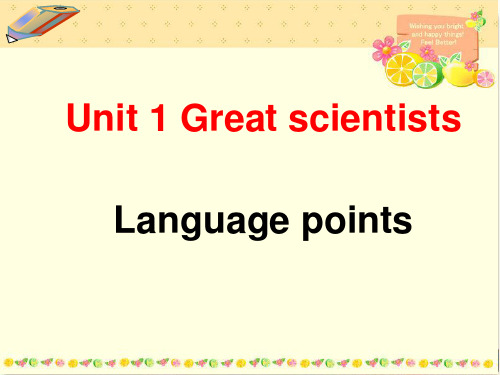
absorb one’s attention 吸引某人的注意力
be absorbed in sth.
专心于某事
be absorbed by/into 被……吞并;为……所吸收
Clever children absorb knowledge easily. He is absorbed in his business.
3、难点
过去分词作定语,表语
一、重要词汇拓展
1.science n.科学 →scientific adj.科学的→ scientist n.科学家 2. announce v.宣布 →announcement n.宣布→ announcer n.广播员,告知者 3. instruct v..指导,命令 →instruction n.指导,指示→ instructive adj.有益的,教育性的 4. enthusiastic adj.热心的,热情的 →enthusiasm n.狂热,热心→ enthusiast n.热心家,狂热者 5. valuable adj.有价值的 →value n. 价值 → value v. 估价, 评价
3. Neither its cause nor its cure was understood. ▲cure vt.&n. 治愈,治疗法;常用于cure sb. of ...结构中。
【易混辨析】
treat和cure
(1) treat强调治疗过程。 treat还可作“对待;看待;款待;请客”讲。 treat sb for sth 医治某人……病 treat...as...把……看作/视为…… treat sb to...请某人……
▲ be exposed to 暴露于……
高手过招
高二英语必修五Unit1语法

高二英语必修五Unit1语法:过去分词做定语表语一、课文句子回顾、分析:1.People absorbed this disease into their bodies with their meals. From the stomach the diseaseattacked the body quickly and soon the affected person died.affected作_______语,affected people表示“_______________________”,2. It came from the river polluted by the dirty water from London.作__ _语,polluted by the dirty water from London表示“_________”,3.He told the astonished people in Broad Street to remove the handle from the water pump sothat it could not be used.astonished作_______语the astonished people表示“_______________________”,4.He became interested in two theories that possibly explained how cholera killed people.interested作_________语,became interested表示“_______________________”,5.He became inspired when he thought about helping ordinary people exposed to cholera.inspired作_________语,became inspired表示“_______________________”,exposed to cholera作_____语,ordinary people exposed to cholera表示“_____________”,6.He found supporting evidence from two other deaths that were linked to the Broad Streetoutbreak.linked作_________语,were linked to表示“_______________________”,二、过去分词作定语(Attribute)一)在句中的位置a broken heart ______________________the risen sun _______________________a lost child ________________________a novel written by Luxun _____________________________a school built for orphans ___________________________the advice given to the patient _____________________________an old man supported by his son _____________________________★总结:过去分词与它所修饰的名词存在逻辑上的___________关系。
英语必修五unit1语法

pay sb. by the hour” 计时给某人报酬。 此题被动结构作表语。类似的有:get
burnt, get hurt , get wounded.
• What he has done is really __C__.Now his parents are _____ him.
③ She was very disappointed to hear the result.
④ He’s quite experienced in teaching beginners.
现在分词和过去分词作表语的区别
• V-ing 形式表示“令人……的” • V-ed 形式表示“某人感到……的”
2. 作定语的动词-ing形式如是一个短语,则 应放在被修饰词的后面,做后置定语,相当 于一个定语从句。
Do you know the boy playing basketball? (=who is playing basketball) 你ciple as attribute & predicative
①过去分词做定语:表被动,表完成。 ②现在分词作定语:表主动,表进行。 ③不定式作定语:表示将要发生的动作。
区别 2
Falling leaves Fallen leaves
区别 2
1. Falling leaves 2. Fallen leaves 3. Disappointing news 4. Disappointed people 5. Exciting story 6. Excited people 7. Tired people/ I’m tired 8. Tiring film
ago. 我们要去看那座建于几百年前的桥。
高二英语必修五unit1知识点
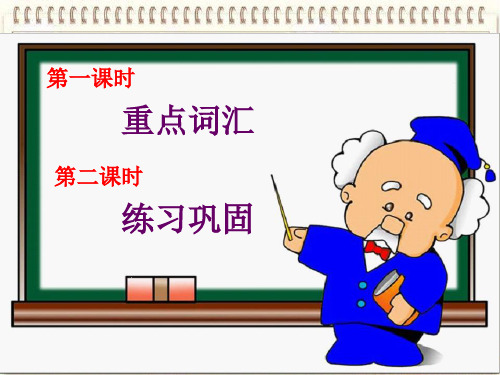
▲absorb意为“吸收;吸引;使专心;合并;吞并”,常见结构: absorb one’s attention 吸引某人的注意力 be absorbed in sth. 专心于某事 be absorbed by/into 被……吞并;为……所吸收
Clever children absorb knowledge easily. He is absorbed in his business.
3、难点
过去分词作定语,表语
一、重要词汇拓展
1.science n.科学 →scientific adj.科学的→ scientist n.科学家 2. announce v.宣布 →announcement n.宣布→ announcer n.广播员,告知者 3. instruct v..指导,命令 →instruction n.指导,指示→ instructive adj.有益的,教育性的 4. enthusiastic adj.热心的,热情的 →enthusiasm n.狂热,热心→ enthusiast n.热心家,狂热者 5. valuable adj.有价值的 →value n. 价值 → value v. 估价, 评价
3. He placed a fixed sun at the centre of the solar system with the planets going round it …..
(with + 宾语+ v. –ing构成的复合结构在句中通常作为状语)
1. John Snow defeats “King Cholera”. ▲defeat意为“击败;打败;使(计划,希望)落空”。
【易混辨析】
defeat, beat与win defeat, beat都表示在战斗或竞赛中“战胜,打败(对手)”,后接竞争对手。如 I can beat/defeat you at swimming. win也表示“战胜,赢得”,但宾语通常是比赛、战争、奖品或表尊重、崇拜之 类意义的词。
外研版高二英语必修5_Module1_单元语法详解

Module1 单元语法详解复习动词时态一、一般现在时1. 表示现在或经常性的动作或状态。
常和often, always, usually, sometimes, every day 等时间状语连用。
I often read books in my spare time.业余时间我经常看书。
2. 表示现在的情况或状态。
I enjoy computer games.我喜欢电脑游戏。
3. 表示客观事实或普遍真理。
The earth revolves around the sun.地球围着太阳转。
4. 在时间、让步和条件状语从句中,用一般现在时代替一般将来时。
You'll make great progress if you work hard!如果你努力学习,就会取得很大进步。
5. 表示按规定、计划或时间表将要发生的事,这类动词或词组有go, come, leave, start, begin, open, close, arrive, take off等,其后常跟有表示将来的时间状语。
The train leaves at 7:25 this evening.火车今晚7:25开。
例1单句填空I will be a nurse and look after patients when I (grow) up.思路分析:当主句为一般将来时时,时间状语从句用一般现在时代替一般将来时。
答案:grow例2单句填空Around two o'clock every night, Sue will start talking in her dreams. It somewhat (bother) us.思路分析:根据时间状语Around two o'clock every night可知设空处应使用一般现在时,主语it为第三人称单数形式,故谓语动词应使用第三人称单数形式。
答案:bothers二、现在进行时1. 现在进行时表示现在或目前一段时间内正在进行的动作。
高二英语必修5 Unit 1 课文知识点梳理

JOHH SHOW DEFEATS “KING CHOLERA”John Snow was a famous doctor in London - so expert, indeed, that he attend ed Queen Victoria as her personal physician. 【so...that引导结果状从】【when引导时间状从;exposed(done)作后定】This was the deadly disease of its day.Neither its cause nor its cure was understood. 【neither...nor的用法;被动语态】So many thousands of terrified people died every time there was an outbreak. 【every time引导时间状从,中间带有一个there be句型】John Snow wanted to face the challenge and solve this problem.He knew that cholera would never be controlled until its cause was found.【that引导的宾从中套一个until引导的时间状从;情态动词的被动语态】He became interested in two theories that possibly explained how cholera killed people.【be/become interested in...;that引导的定从中套一个how引导的宾从】The first suggested that cholera multiplied in the air.【that引导宾从】A cloud of dangerous gas floated around until it found its victims. 【until引导时间状从】The second suggested that people absorb ed this disease into their bodies with their meals.【that引导宾从】From the stomach the disease quickly attacked the body and soon the affected person died.John Snow suspected that the second theory was correct but he needed evidence.【that引导宾从】So when another outbreak hit London in 1854, he was ready to begin his enquiry.【when引导时间状从】As the disease spread quickly through poor neighbourhoods, he began to gather information.【as引导时间状从】In two particular streets, the cholera outbreak was so severe that more than 500 people died in ten days.【so...that引导结果状从】He was determined to find out why.【被动语态】First he marked on a map the exact places where all the dead people had lived.【where引导定从】This gave him a valuable clue about the cause of the disease.Many of the deaths were near the water pump in Broad Street (especially numbers 16, 37, 38 and 40).He also noticed that some houses (such as 20 and 21 Broad Street and 8 and 9 Cambridge Street) had had no deaths.【that引导宾从;had done过去完成时】He had not foreseen this, so he made further investigations.He discovered that these people worked in the pub at 7 Cambridge Street.【that引导宾从】They had been given free beer and so had not drunk the water from the pump.【过去完成时的被动;so和had间省略主语they】It seemed that the water was to blame.【that引导表从】Next, John Snow looked into the source of the water for these two streets.【that引导宾从;polluted作后定(高考中出现过)】He immediately told the astonished people in Broad Street to remove the handle from the pump so that it could not be used.【so that引导目的状从(是为了);情态动词的被动】Soon afterwards the disease slowed down.He had shown that cholera was spread by germs and not in a cloud of gas.【that引导宾从;被动语态】In another part of London, he found supporting evidence from two other deaths that were linked to the Broad Street outbreak.【that引导定从】A woman, who had moved away from Broad Street, liked the water from the pump so much that she had it delivered to her house every day.【who引导非限制定从;so...that引导结果状从】Both she and her daughter died of cholera after drinking the water.With this extra evidence John Snow was able to announce with certainty that polluted water carried the virus.【that引导宾从(没有直接跟在谓语动词之后)】To prevent this from happening again, John Snow suggested that the source of all the water supplies be examined.【that引导宾从】The water companies were instruct ed not to expose people to polluted water any more.Finally "King Cholera" was defeated.定向练习,举一反三一、单词和短语1.The medicine will cure you ______ your cough.2.The doctor devoted himself to finding the cure ______ the disease.3.Most shin cancers are _______ (cure) if _______ (treat) early.4.Many patients are not getting the medical ________ (treat) they need.5.She likes her job to be ______ challenge.6.The new discovery ________ (challenge) traditional beliefs in 1850.7.Reducing the gap between rich and poor is one of the _________ (challenge) the government faces.8.Try tennis, badminton or boring. In short, try anything _________ (challenge).pletely ________ (absorb) in her new novel, the young writer kept thinking and writing in her study for a dozen hours.10.His ability _______ (absorb) information was astonishing, but his concentration time was short.11.Those small companies have been absorbed ______ the large company.12.When something did interest me, I could become ______ (absorb).13.He left office after _________ (suspect) of theft.*14.They suspected him ______ giving false evidence.15.He is the first _________ (suspect) of giving away government secrets to the enemy.*16.She blamed him ______ the failure of their marriage.17.If you fail the exam, you will only have yourself ________ (blame).18.Which driver was _______ (blame) for the accident?19.They put the blame for the abortion of the project ______ us.20._______ (blame) for the broken vase, the boy hung his head.21.There’s _____ direct link between diet and heart disease.22.The police suspect that the two cases may _______ (link).23.The Channel Tunnel _______ (link) Britain with the European contient.24.They walked with their arms ______ (link).25.Always read the _________ (instruct) on the bottle thoroughly and take the right amount ofmedicine.26.He is the ________ (instruct) who taught me how to shi.st week, we _________ (instruct) by our clients that you owe them 300 dollars.28.He instructs us ______ making self-introduction.29.She arrived at 10 o’clock as _______ (instruct).30.All the evidence suggests that he _______ (steal) the money.31.Earlier reports suggested that a meeting _________ (take) place next Sunday.32.I suggest that you _______ (thought) over your position very carefully.33.I suggest _______ (add) vitamins E and A to your diet.34.He suggested that we _______ (hold) a meeting to discuss this problem.35.He suggested _______ (hold) a meeting to discuss this problem.36.The doctor advised my father _______ (give) up smoking.37.The volunteers contribute most of their own spare time ______ the project.38.The young population of a nation are the people ________ (contribute) most to a country’s economic development.39.Her ________ (contribute) to the reaserch were largely unacknowledged.二、语法专项1.后置定语(1)The adobe dwellings(土坯房) ______ (build) by the Pueblo Indians are admired by even the most modern architects. (2015年全国卷)(2)The airport _______ (complete) last year has helped promote tourism in this area.(3)There are hundreds of vistor _______ (wait) in front of the Art Gallery.COPERNICUS’ REVOLUTIONRRY THEORYNicolaus Copernicus was frightened and his mind was confused.Although he had tried to ignore them, all his mathematical calculations led to the same conclusion that the earth was not the centre of the solar system.【although引导让步状从;that引导同位从】Only if you put the sun there did the movements of the other planets in the sky make sense.【if引导条件状从;only放句首时,句子要用部分倒装(波浪线部分为主句谓语动词,did助动词置于主句主语之前)】【as引导原因状从;would have done虚拟语气】They believed God had made the world and for that reason the earth was special and must be the centre of the solar system.【省略that的宾从;for‘由于...’】The problem arose because astronomers had noticed that some planets in the sky seemed to stop, move backward and then go forward in a loop.【because引导原因状从;that引导宾从】Others appeared brighter at times and less bright at others.This was very strange if the earth was the centre of the solar system and all planets went round it.【if引导条件状从】Copernicus had thought long and hard about these problems and tried to find an answer.He had collected observations of the stars and used all his mathematical knowledge to explain them.But only his new theory could do that.So between 1510 and 1514 he worked on it, gradually improving his theory until he felt it was complete.【until引导时间状从】In 1514 he showed it privately to his friends.The changes he made to the old theory were revolutionary.【省略that/which的定从】He placed a fixed sun at the centre of the solar system with the planets going round it and only the moon still going round the earth.He also suggested that the earth was spinning as it went round the sun and this explained changes in the movement of the planets and in the brightness of the stars.【that引导宾从;as引导时间状从】His friends were enthusiastic and encouraged him to publish his ideas, but Copernicus was cautious.He did not want to be attacked by the Christian Church, so he only published it as he lay dying in 1543.【as引导时间状从】Certainly he was right to be careful. The Christian Church rejected his theory, saying it was against God's idea and people who supported it would be attacked.【who引导定从】Yet Copernicus' theory is now the basis on which all our ideas of the universe are built.【on which 引导定从】His theory replaced the Christian idea of gravity, which said things fell to earth because God created the earth as the centre of the universe.【which引导非限制定从中套一个because引导的原因状从】Copernicus showed this was obviously wrong.Now people can see that there is a direct link between his theory and the work of Isaac Newton, Albert Einstein and Stephen Hawking.【that引导宾从】。
人教课标版高中英语必修5 Unit1_单元语法详解
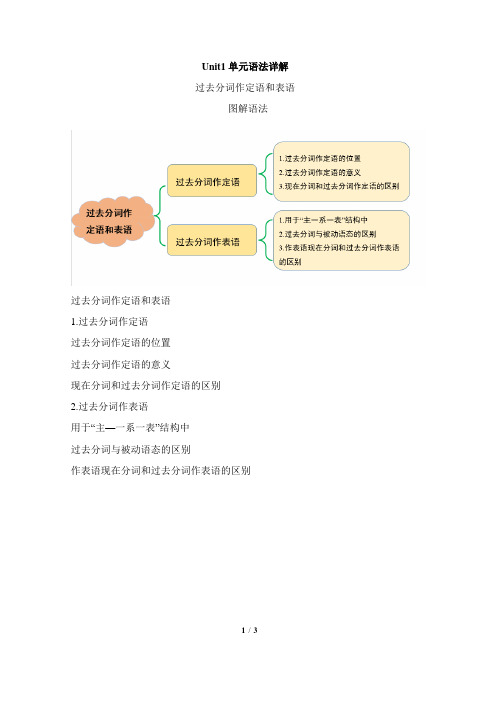
Unit1单元语法详解过去分词作定语和表语图解语法过去分词作定语和表语1.过去分词作定语过去分词作定语的位置过去分词作定语的意义现在分词和过去分词作定语的区别2.过去分词作表语用于“主—一系一表”结构中过去分词与被动语态的区别作表语现在分词和过去分词作表语的区别1/ 3归纳语法过去分词,也称动词的-ed形式,是一种非限定动词。
规则动词的-ed形式由动词原形词尾加-ed构成,也有不规则动词变化表。
动词的-ed形式只有一种形式,没有时态和语态的变化。
它在句子中可以充当定语、表语等成分。
一、过去分词作定语1.过去分词作定语时的意义过去分词作定语,强调被动或者完成。
The wind swept the fallen leaves.风刮走了落叶。
Her daughter brought up by me has begun to work.她由我带大的那个女儿已经开始工作了。
fallen leaves 落叶/falling leaves正在飘落的树叶2.过去分词作定语时的位置(1)单个的过去分词作定语,常放在所修饰的词的前面;过去分词短语作定语时,常放在所修饰的词之后,此时,它相当于定语从句。
He told me that this was the wounded soldier.他告诉我这就是那个受伤的士兵。
Don't use words, expressions or phrases known only to people with specific knowledge. 不要使用仅仅有特定知识的人才知晓的单词、词组或短语。
Near the window is a bookshelf filled with books (=which is filled with books).靠近窗户有一个装满书的书架。
2/ 3Most of the students invited to the garden party (=who were invited to the garden party)came from our school.大部分被邀请参加游园会的学生来自我们学校。
人教版高二英语 必修五unit1 知识点
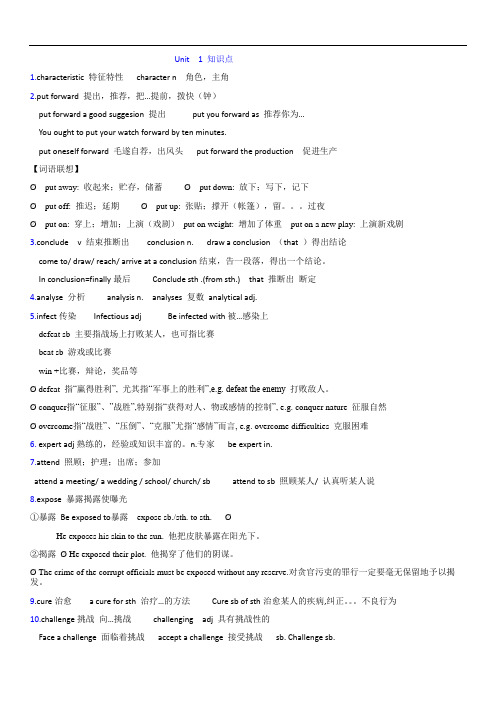
Unit 1 知识点1.characteristic 特征特性character n 角色,主角2.put forward 提出,推荐,把…提前,拨快(钟)put forward a good suggesion 提出put you forward as 推荐你为…You ought to put your watch forward by ten minutes.put oneself forward 毛遂自荐,出风头put forward the production 促进生产【词语联想】Ø put away: 收起来;贮存,储蓄Ø put down: 放下;写下,记下Ø put off: 推迟;延期Ø put up: 张贴;撑开(帐篷),留。
过夜Ø put on: 穿上;增加;上演(戏剧)put on weight: 增加了体重put on a new play: 上演新戏剧3.conclude v 结束推断出conclusion n. draw a conclusion (that )得出结论come to/ draw/ reach/ arrive at a conclusion结束,告一段落,得出一个结论。
In conclusion=finally最后Conclude sth .(from sth.) that 推断出断定4.analyse 分析analysis n. analyses 复数analytical adj.5.infect传染Infectious adj Be infected with被…感染上defeat sb 主要指战场上打败某人,也可指比赛beat sb 游戏或比赛win +比赛,辩论,奖品等Ø defeat 指“赢得胜利”, 尤其指“军事上的胜利”,e.g. defeat the enemy 打败敌人。
高中英语必修五Unit 1 PPT语法课件
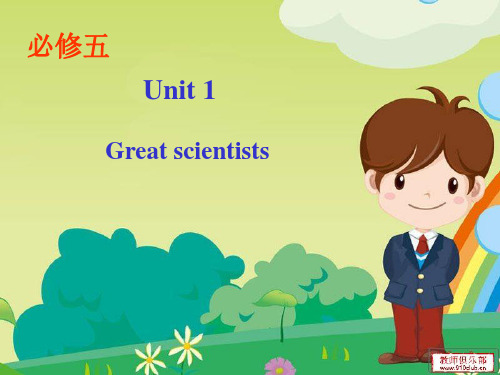
过去分词和现在分词在做定语时的区别:
1.语态上 现在分词: 表示主动的动作 过去分词: 表示被动的动作
He is the man swimming in the river just now. He was reading a novel written by Charles Dickens.
2.时间上
单个的过去分词作定语时,位于它所修饰 的名词或代词前面; a broken heart 一颗破碎的心 the risen sun 已经升起的太阳 丢失的孩子 a lost child 注意:单个过去分词修饰 something,
everything, anything, nothing, somebody, nobody,those 等不定代词时,要放在这些词
examined in the hospital yesterday The children ________________________昨 天在医院检查的) were seriously ill. The people _________________(暴露在阳光 exposed to the sun 下的) got sunburnt. The boy _____________________________( punished severely by the teacher 受到老 师严厉惩罚的) is now a college student. The water delivered to his home ___________________________(送到他家 的水) carried disease.
The press(出版社) publishing his book is ___________ famous in the city.
高二英语必修五unit1语法总结

Unit 1 语法重点非谓语动词:to do/doing一、动词不定式不定式可以用来做主语、表语、定语、状语、宾语、独立成分,表示比较具体的意义。
(1)做主语①动词不定式短语To master a foreign language is no easy job.To see this film is to waste time.To solve this problem is out of the question②为平衡整个句子,避免头重脚轻,常用it做形式主语,而将真正主语不定式放后面,用于这种形式是一些特定的结构。
例如:1)谓语部分是系表结构,表语是某些形容词或名词。
例如:It is foolish to do in this way. It sounds reasonable to do it this way.2)某些动词做谓语时。
例如:It took much time to do this. It makes us excited to think about that.(2) 做表语表示打算、计划、命令和要求,用于appear, seem, happen等系动词后面Such questions are to be avoided. What he said proved to be true.He seems to be ill.(3) 做定语做定语时不定式一般紧跟其所修饰名词或代词后面。
例如:He was the first one to come this morning.chance to go to school in the past.He didn’t have the如果不定式是不及物动词时,应注意其相应介词的搭配。
例如:He has nothing to worry about.She is a very nice person to work with.(4) 作状语不定式作状语可以表示目的、原因和结果。
高二英语必修五第一单元语法

过去分词作定语1)语法功能过去分词或过去分词短语作定语时,其功能相当于一个定语从句。
被修饰的词是分词所表示的行为的承受者;在逻辑上,它们是动宾关系。
The stolen bike belongs to Jack. The bike which was stolen belongs to Jack.The lecture given by Professor Zhang is about environment protection.The lecture which was given by Professor Zhang is about the environment protection.a.单个的过去分词作定语时,位于它所修饰的名词或代词前面。
the affected people受感染的人 a broken heart一颗破碎的心a lost dog丧家之犬 a broken glass被打破的玻璃杯Attention:过去分词修饰 something, everything, anything, nothing, somebody, nobody,those 等不定代词时,要放在这些词后面。
Is there anything unsolved?There is noting changed here since I left this town.b. 过去分词短语作定语:通常后置,其作用相当于定语从句。
people exposed to cholera= people who was exposed to cholerathe book recommended by Jack= the book which was recommended by Jackthe machines produced last year= the machines which were produced last yearc. 不及物动词的过去分词作定语时不表被动,只表完成。
高二上必修五-Unit 1--知识点

[教材P2原句] Neither its cause nor its cure was understood.
它的病因和治疗方法都不为人所知
cure
a cure for sth. 治疗某病的药物/方法
cure sb. of sth. 治好了某人的…
n. 治愈; 疗able adj. 可治愈的
cure 争通常强调结果,指治愈某种
病. 常用cure sb of sth.
treat 通常强调过程,指对病人进
行的诊断和治疗,但不含治好的意 思。常用 treat sb for sth
[教材P2原句] The second suggested that people absorbed this disease into their bodies with their meals .
在伦敦的另一个地方,他从两个与宽街爆发疫情有关的死亡病例中找到了有力的证据 。
link A to B
把A与B连接;联系
被动:be linked to
[教材P3原句] The water companies were instructed not to expose people to polluted water any more. 自来水公司接到指示,不准人们再接触被污染的水
约翰.斯诺是一位著名的医生--他的确医术精湛,以至成为照料维多利亚女王的私人医生.
attend v.
照顾;注意;出席
attendance n. 出席;到场;出席人数; attendant n. 服务员,侍者
attend (to) sb 照顾某人 attend to sth 处理某事,专心于某事 attend a meeting 参加会议
(完整版)人教版高中英语必修五Unit1知识点详解
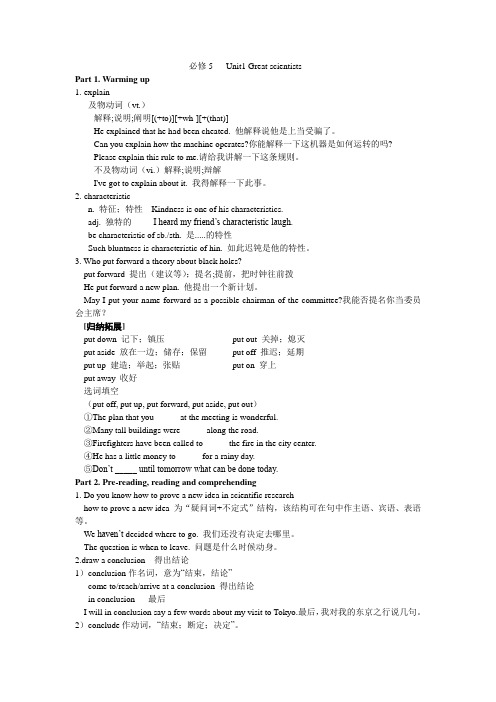
必修5 Unit1 Great scientistsPart 1. Warming up1.explain及物动词(vt.)解释;说明;阐明[(+to)][+wh-][+(that)]He explained that he had been cheated. 他解释说他是上当受骗了。
Can you explain how the machine operates?你能解释一下这机器是如何运转的吗?Please explain this rule to me.请给我讲解一下这条规则。
不及物动词(vi.)解释;说明;辩解I've got to explain about it. 我得解释一下此事。
2.characteristicn. 特征;特性Kindness is one of his characteristics.adj. 独特的I heard my friend’s characteristic laugh.be characteristic of sb./sth. 是.....的特性Such bluntness is characteristic of hin. 如此迟钝是他的特性。
3. Who put forward a theory about black holes?put forward 提出(建议等);提名;提前,把时钟往前拨He put forward a new plan. 他提出一个新计划。
May I put your name forward as a possible chairman of the committee?我能否提名你当委员会主席?[归纳拓展]put down 记下;镇压put out 关掉;熄灭put aside 放在一边;储存;保留put off 推迟;延期put up 建造;举起;张贴put on 穿上put away 收好选词填空(put off, put up, put forward, put aside, put out)①The plan that you _____ at the meeting is wonderful.②Many tall buildings were _____ along the road.③Firefighters have been called to _____ the fire in the city center.④He has a little money to _____ for a rainy day.⑤Don’t _____ until tomorrow what can be done today.Part 2. Pre-reading, reading and comprehending1. Do you know how to prove a new idea in scientific researchhow to prove a new idea 为“疑问词+不定式”结构,该结构可在句中作主语、宾语、表语等。
译林牛津版高二英语必修五unit1 知识点及语法总结(完整资料).doc
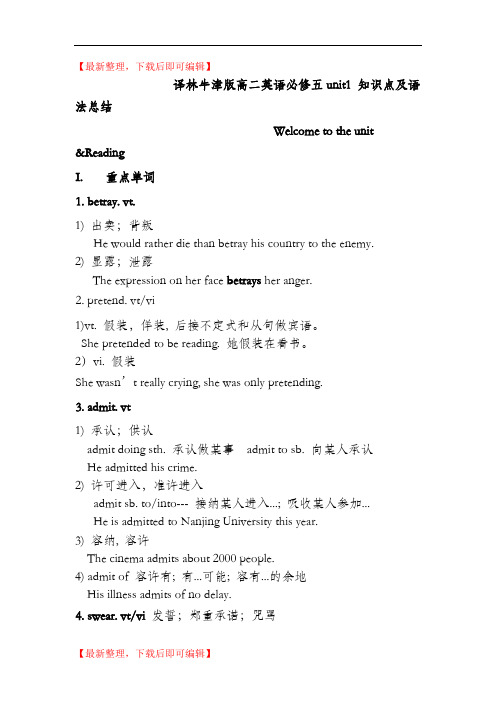
【最新整理,下载后即可编辑】译林牛津版高二英语必修五unit1 知识点及语法总结Welcome to the unit&ReadingI.重点单词1. betray. vt.1) 出卖;背叛He would rather die than betray his country to the enemy.2) 显露;泄露The expression on her face betrays her anger.2. pretend. vt/vi1)vt. 假装,佯装, 后接不定式和从句做宾语。
She pretended to be reading. 她假装在看书。
2)vi. 假装She wasn’t really crying, she was only pretending.3. admit. vt1) 承认;供认admit doing sth. 承认做某事admit to sb. 向某人承认He admitted his crime.2) 许可进入,准许进入admit sb. to/into--- 接纳某人进入...; 吸收某人参加...He is admitted to Nanjing University this year.3) 容纳, 容许The cinema admits about 2000 people.4) admit of 容许有; 有...可能; 容有...的余地His illness admits of no delay.4. swear. vt/vi 发誓;郑重承诺;咒骂swear to sb. / swear that 从句向某人承诺发誓swear—swore ---sworn5. focus. n/vt/vi1) n. 焦点,注意力put focus on 集中注意力于…..2) vi/vtfocus on集中注意力于….近义词组:concentrate onpay full attention todevote … to6. guilty. adj 有罪的1) be guilty of “犯了……罪”In the process of gaining our rightful place, we must not be guilty of wrongful deeds.2)be found guilty 被判决有罪Maggie could be sentenced to up to three years in prision if (he was) found guilty.7. remark. Vt / n 评论make remarks on sth = make comments on sth对…作出评论8. apologize. vi 道歉apologize to sb=make an apology to sb 向某人道歉9. sensitive. adj 敏感的;体贴的be sensitive to 对…体贴,敏感10. blame. n/vt 责备1) n. put blame on sb 责备某人2) vt. blame sb for sth 因某事责备某人blame sth on sb 把某事归咎于某人He blamed his faiure on his teacher.sb be to blame= sb should be blamed 主动形式表被动You are to blame. 你应该受责备。
- 1、下载文档前请自行甄别文档内容的完整性,平台不提供额外的编辑、内容补充、找答案等附加服务。
- 2、"仅部分预览"的文档,不可在线预览部分如存在完整性等问题,可反馈申请退款(可完整预览的文档不适用该条件!)。
- 3、如文档侵犯您的权益,请联系客服反馈,我们会尽快为您处理(人工客服工作时间:9:00-18:30)。
Unit 1 语法重点一、动词不定式不定式可以用来做主语、表语、定语、状语、宾语、独立成分,表示比较具体的意义。
(1)做主语①动词不定式短语To master a foreign language is no easy job.To see this film is to waste time.To solve this problem is out of the question②为平衡整个句子,避免头重脚轻,常用it做形式主语,而将真正主语不定式放后面,用于这种形式是一些特定的结构。
例如:1)谓语部分是系表结构,表语是某些形容词或名词。
例如:It is foolish to do in this way. It sounds reasonable to do it this way.2)某些动词做谓语时。
例如:It took much time to do this. It makes us excited to think about that.(2) 做表语表示打算、计划、命令和要求,用于appear, seem, happen等系动词后面Such questions are to be avoided. What he said proved to be true.He seems to be ill.(3) 做定语做定语时不定式一般紧跟其所修饰名词或代词后面。
例如:He was the first one to come this morning.He didn’t have the chance to go to school in the past.如果不定式是不及物动词时,应注意其相应介词的搭配。
例如:He has nothing to worry about.She is a very nice person to work with.(4) 作状语不定式作状语可以表示目的、原因和结果。
①表目的常用in order to, so as to,等结构但so as to只能放在主句之后。
Check your homework so as to avoid mistakes.She goes home (in order) to see her grandmother every week.②表结果常用only to do, enough to do, too…to do等句型,不定式短语作结果状语具有“意料之外”之意。
He is too excited to speak anything.I hurried to his house, only to find him out.③原因She seemed surprised to see us.He is sorry for what he did to think of his past.-不定式作方式状语时,通常采用as if 或 as though + to 的结构,其意为“好像要……”。
He raised his hand as if to hit me.She took out a pen and a piece of paper as though to write something.(5) 做宾语①某些及物动词要用动词不定式作宾语, 以下及物动词常用动词不定式作宾语:agree, ask, attempt, choose, continue, decide, desire, determine, expect, forget,hope,,intend, learn, manage, mean, offer, prefer,,promise, refuse, try,want, wish等。
例如:②动词不定式作宾语时,如其后有补足语,则可以用先行语it作形式宾语,而将真正宾语动词不定式后移,用于该形式的常见动词有:believe, consider, feel, guess, imagine, know, make, prove, realize, see, show, suppose, think, understand, find等。
例如:I felt it useless for us to say anything further.I made it a rule to get up early, take a cold bath, and then do some running.(6) 做宾语补足语①带to的不定式做宾补有相当数量的及物动词或短语可以接带to的不定式做宾补。
例如:I shall try to persuade her to see the doctor. The villagers didn’t allow them to do this.I will ask them to leave the company. I shall persuade him to take the medicine.②不带to的不定式做宾补也有一些及物动词后接不带to的不定式作宾补,常见的有使役动词类:make, let, have;感官动词类:see, watch, look at, notice, observe, hear, listen to, smell, feel等。
但在被动结构中要带to (let除外)。
例如:Someone saw him enter my room. He was seen to enter my room.The boy made the baby laugh. The baby was made to laugh(7)“疑问词+不定式”相当于这些疑问代词和副词引导的名词性从句。
常见引导该形式的动词有:decide, find out, forget, inquire, know, learn, remember, see, settle, think, 在句子中可以做主语、宾语或表语。
例如:What to do next has not been decided. = What will do next has not been decided.What worries me most is how to do it. = What worries me most is how we will do it.I don’t know when to leave. = I don’t know when we will leave.(10) 动词不定式的复合结构①不定式的复合结构做主语时,常见用两种特定句型: “It is + adj. for / of sb. to do sth.”和“It is + n. of sb. to do sth”。
例:It is easy for us to understand the sentence.It is clever of you to do that.二、动名词动名词是一种非谓语形式,起名词的作用,但带有动词的特征,可以有自己的宾语和状语,构成动名词短语。
1.动名词的用法(1) 做主语①动名词做主语表示比较抽象、习惯性和经常性的意义.例如:Saying is easier than doing. Collecting stamps is a good hobby.②为平衡整个句子,避免头重脚轻,常用it做形式主语,而将真正主语不定式放后面,用于这种形式是一些特定的结构。
例如:1) 谓语部分是系表结构,表语是某些形容词。
例如:It’s interesting planning a holiday. It’s rather tiring walking around in a city.2) 当use,good,waste,bore,fun,shame,encouragement,等名词作表语时,通常用it作形式主语,把作为真正主语的动名词后置。
例如:It’s no use talking to him again. = There is no use talking to him again.It’s no good refusing to do it. = There is no good refusing to do it.(2) 作宾语某些动词或短语动词后面可以接动名词,见下表:①放在介词on; upon,after等后面时,例如:On arriving Beijing, he went to see his friend.After standing in the queue for hours, we got good seats.③有些后面可跟动名词也可以跟不定式,意义区别不大。
常见的动词有:s tart, like, hate, love, continue, prefer, attempt, intend, propose等。
He began learning (to learn) English at the age of five.④有些动词后面可跟动名词也可以跟不定式,意义区别大。
见下表:(3) 作表语相当于名词,说明主语动作的情况和状态。
例如:My job is teaching English.Her job is taking care of the children.Our duty is serving the people. = Our duty is to serve the people.(4) 作定语说明所修饰词的性质,具有名词的性质,它同所修饰的名词间不存在主谓关系。
a living room = a room for living a swimming pool = a pool for swimminga waling stick = a stick for walking(5) 动名词的复合结构动名词之前的名词,如果是有生命的,通常用所属格表示,如果是无生命的,则用通格表示,现在有一种趋势用名词和代词代替所有格。
His coming won’t help much.I don’t mind your (you) smoking.They insisted on our staying there. We are happy about his coming to see us.Do you remember Mary coming to see you? He insisted on being sent to the hard area.(6) 动名词的主动形式表示被动意义① be worth 后接动名词时。
